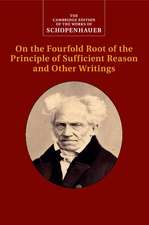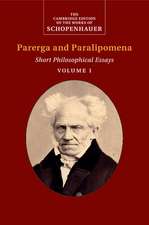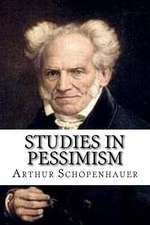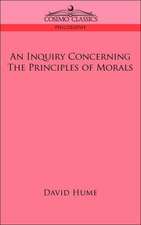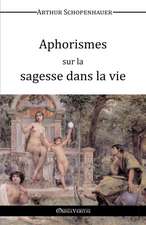On Human Nature: Essays in Ethics and Politics: Dover Books on Western Philosophy
Autor Arthur Schopenhauer Traducere de Thomas Bailey Saundersen Limba Engleză Paperback – 31 oct 2010
More than any other work, "On Human Nature" offers an expression of Schopenhauer's views, including the depth of his interests, his biases, and his philosophy. Students of history and philosophy along with other readers will appreciate these lucid, accessible observations on government, free will and fatalism, character, moral instinct, and ethics.
| Toate formatele și edițiile | Preț | Express |
|---|---|---|
| Paperback (7) | 28.44 lei 22-36 zile | |
| Dover Publications – 31 oct 2010 | 28.44 lei 22-36 zile | |
| CREATESPACE – | 83.77 lei 22-36 zile | |
| COSIMO CLASSICS – 31 mai 2007 | 77.91 lei 43-57 zile | |
| BLURB INC – 22 feb 2019 | 81.63 lei 17-23 zile | |
| Crescent Moon Publishing – 9 apr 2023 | 91.62 lei 43-57 zile | |
| Antiquarius – 20 noi 2020 | 97.83 lei 38-44 zile | |
| University Press of the Pacific – 31 mai 2002 | 117.87 lei 43-57 zile | |
| Hardback (1) | 161.01 lei 43-57 zile | |
| COSIMO CLASSICS – 30 iun 2010 | 161.01 lei 43-57 zile |
Din seria Dover Books on Western Philosophy
-
 Preț: 110.32 lei
Preț: 110.32 lei -
 Preț: 75.88 lei
Preț: 75.88 lei -
 Preț: 39.17 lei
Preț: 39.17 lei -
 Preț: 72.56 lei
Preț: 72.56 lei -
 Preț: 48.65 lei
Preț: 48.65 lei -
 Preț: 55.25 lei
Preț: 55.25 lei -
 Preț: 55.88 lei
Preț: 55.88 lei -
 Preț: 52.36 lei
Preț: 52.36 lei -
 Preț: 93.40 lei
Preț: 93.40 lei -
 Preț: 52.55 lei
Preț: 52.55 lei -
 Preț: 54.19 lei
Preț: 54.19 lei -
 Preț: 81.23 lei
Preț: 81.23 lei - 22%
 Preț: 34.47 lei
Preț: 34.47 lei -
 Preț: 48.65 lei
Preț: 48.65 lei -
 Preț: 41.17 lei
Preț: 41.17 lei
Preț: 28.44 lei
Nou
Puncte Express: 43
Preț estimativ în valută:
5.44€ • 5.70$ • 4.53£
5.44€ • 5.70$ • 4.53£
Carte disponibilă
Livrare economică 10-24 martie
Preluare comenzi: 021 569.72.76
Specificații
ISBN-13: 9780486478418
ISBN-10: 0486478416
Pagini: 82
Dimensiuni: 136 x 218 x 5 mm
Greutate: 0.11 kg
Editura: Dover Publications
Seria Dover Books on Western Philosophy
ISBN-10: 0486478416
Pagini: 82
Dimensiuni: 136 x 218 x 5 mm
Greutate: 0.11 kg
Editura: Dover Publications
Seria Dover Books on Western Philosophy
Notă biografică
Arthur Schopenhauer was among the first 19th century philosophers to contend that at its core, the universe is not a rational place. Inspired by Plato and Kant, both of whom regarded the world as being more amenable to reason, Schopenhauer developed their philosophies into an instinct-recognizing and ultimately ascetic outlook, emphasizing that in the face of a world filled with endless strife, we ought to minimize our natural desires for the sake of achieving a more tranquil frame of mind and a disposition towards universal beneficence. Often considered to be a thoroughgoing pessimist, Schopenhauer in fact advocated ways - via artistic, moral and ascetic forms of awareness - to overcome a frustration-filled and fundamentally painful human condition. Since his death in 1860, his philosophy has had a special attraction for those who wonder about life's meaning, along with those engaged in music, literature, and the visual arts.





